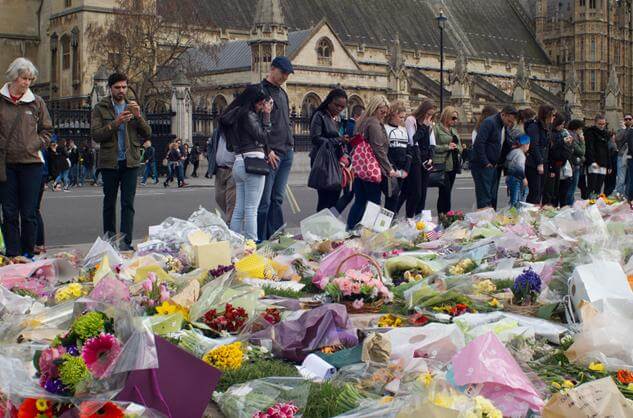Patricia*, 65, was on a bus crossing Westminster Bridge when she witnessed the terrorist attack on 22nd March 2017.
She told us about her experience and the support she received from Victim Support.
‘I saw the driver coming down on the inside lane coming very fast. At first I thought the car was out of control, it was plunging into people standing on the pavement of the bridge, but then I saw the driver reverse and then hit more people.
‘At the time I was very frightened and didn’t know what was happening. I didn’t know it was a terror attack. The police were shouting to get off bus and move away from the area.
‘People were fainting around us, just dropping to the floor. Someone came past saying someone had been shot, but we didn’t know who — it was only when I watched the news later I realised what had happened.
‘At the time because of the chaos it was difficult to know what was happening and I thought it was a hit and run.
‘When I went home and saw the news it almost felt more dangerous than it had at the time and it was only in the aftermath I was so disturbed by it.
‘I suffered from flash backs and had difficulty sleeping. I felt like I wanted to talk about it all the time but people weren’t that interested.
‘It was like they couldn’t grasp if they hadn’t been there. I was telling people they had a glazed look. Fortunately, my partner was with me so it helped we could talk about it.
‘For a long time I tried to find an organisation that could support me with what I was suffering as a result of the attack.
‘I asked around and spoke to friends to see if they could think of anywhere I could go to get help. I emailed a few places and eventually ended up finding Victim Support myself.
‘I was aware of the charity as I had done some volunteer work for them around 25 years ago. I rang up and spoke to someone to ask if they could help witnesses of terrorist attacks and they referred me to someone from my local Victim Support office.
‘I was contacted by my support worker soon after that, which was the quickest support to come to fruition.
‘I had around two or three appointments which were face-to-face, where I received emotional support from my case worker.
‘I then moved on to a counselling service — but these sessions were very useful in supporting me in that time.
‘After our meetings, and once I was engaged with a counsellor, my support worker still kept in touch every few weeks over the phone to see how I was doing.’
*Name changed to protect the person’s identity
If you need support, you can find all the information you need on our website.
You can also donate to our One UK appeal to help us support people affected by terrorism.

